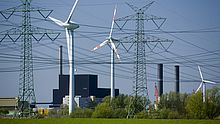Grid expansion as the foundation for a successful energy transition
Increasing numbers of decentralised suppliers of renewable energies and rapid fluctuation in power generation – these two aspects concisely summarise the ongoing transformation that the electricity grid must successfully overcome. dena keeps its eye on “work in progress” within the German electricity infrastructure, brings together important stakeholders in the energy sector and prepares concepts for innovative solutions: for instance with its large-scale analyses and the recommendations in the dena Grid Study II and the dena Distribution Grid Study. The results suggest the wisdom of a two-pronged approach: first it will be necessary to build new power lines; secondly, it is imperative to exploit a range of methods that will improve the capacity utilisation of the existing electricity grids.
dena Grid Study II: Grid expansion in the area of extra-high voltage
Applying a broad approach to system optimisation, the dena Grid Study II provides a robust foundation to develop extra-high-voltage grids in Germany. The study investigated the grid infrastructure requirements if renewable energy sources are expanded to account for 39 percent of electricity supply by 2025. Here, the study considers a variety of different transmission technologies, an increase in storage capacities, demand-side measures to relocate load and an increase in European collaboration in electricity trading. The results elucidate that expanding and modernising the grid infrastructure will play a crucial role, as the discrepancy between increasing the share of renewable energy sources and the capabilities of the electricity grids would simply become too severe.


